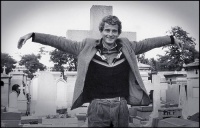Difference between revisions of "Guy Hocquenghem"
| Line 41: | Line 41: | ||
* [[Documentary Filmmakers From the LGBTQ Community]] | * [[Documentary Filmmakers From the LGBTQ Community]] | ||
* [[LGBTQ Philosophers and Teachers of Philosophy]] | * [[LGBTQ Philosophers and Teachers of Philosophy]] | ||
| + | * [[Prominent Members of ACT UP]] | ||
==Further Reading/Research== | ==Further Reading/Research== | ||
Latest revision as of 15:06, 28 August 2022
Country
France
Birth - Death
1946 - 1988
Occupation
Academic
Description
Guy Hocquenghem was an academic who advanced earlier philosophical thinking on sexual identity to create a new field of study called Queer Theory. This area of study explores all aspects of sexual activity including homosexual behaviour, but also extending it to study any kind of sexual activity that falls into both normative and deviant categories.
Guy grew up with a clear leaning to leftist thinking. His studies were grounded in the study of philosophy. He was a member of the Communist Party but they expelled him because of his homosexuality. He was the first gay man to be a member of the radical lesbian action group Front Homosexuel d’Action Revolutionnaire. He taught philosophy at the University of Vincennes-Saint Denis in Paris.
Hocquenghem's book Homosexual Desire (‘Le Desire Homosexuel’, 1972) is considered to be the first book on Queer Theory and that established its framework of study. In the book, he analyzes how the homosexual as a social being came to be constituted in the capitalist society. Specifically, he tries to show that, contrary to the accepted popular theory of his time that homosexuality is a learned trait, and contrary to the activists’ position that homosexuality is defined in a genetic, social, or psychological context, it is actually defined through the devaluation of body parts through the creation of class structures.
As a result of these different views, Hocquenghem argues that the homosexual activist movement was moving inwards when it addressed questions about culture and identity, rather than outwards towards outright social revolution. When taken in Hocquenhem’s context, the study of Queer Theory expands the analysis of sexual diversity to include aspects of sexual deviancy and all forms of non-normative behavior.
This new analysis allows for the inclusion of, for example, topics such as cross-dressing, intersex, gender ambiguity, and gender-corrective surgery.
Hocquenhem advances on the work of Michael Foucault in that the basis of its studies is on the analysis of the validity of heteronormative discourse. It looks at Queer as a product of cultural and theoretical pressures, and in Hocquinghem's case specifically, those derived from the workings of the capitalist political and economic system.
Once again, it is certain that Hocquinghem's theories were driven by his own lifestyle and experience. He was a homosexual that often faced exclusion and rejection. This came in the form of political exclusion, academic isolation, and social exclusion.
Hocquenghem was an active participant in the 1968 student rebellion in France, and this undoubtedly had an impact on his thoughts. The rebellion radically altered the academic structures of France. Hocquenghem was very much a leader in the gay liberation movement of the early 1970s. He has been described as being responsible for its momentum, it's theory, and it's character in France.
Hocquenghem expanded his work to include experimental fiction and he produced a documentary film about gay history. In these efforts, he adopted the belief that one could escape from the restrictions of the real world by gaining the knowledge of other worlds through special studies unknown to others. Thus, for example, through the use of pleasure one can escape the real world and enter into a fictional counterpart.
Part of this thinking no doubt came from the fact that Hocquenghem was dying from AIDS. At the time, this disease had became the basis for the argument of the immorality of the homosexual movement, and it became defined by detractors as a punishment to the LGBTQ community. This ridiculous position, together with his personal fight with the disease, became a preoccupation in his writing. One can see the follow-through of him personally dealing with the AIDS disease (taking drugs, for example) in his formal thinking about the state of the homosexual movement and the need to escape the real world of persecution and intolerance.
See Also
- Academics Specializing in the History of the LGBTQ Community
- Queer Theorists
- Documentary Filmmakers From the LGBTQ Community
- LGBTQ Philosophers and Teachers of Philosophy
- Prominent Members of ACT UP

